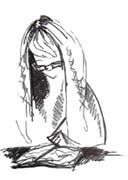 This is the sort of book that I want to begin again as soon as I finish the last page. In my experience, this doesn't mean that the book was merely "good," but that it had so much heft to it that there was no way of getting the whole thing in one reading--layers upon layers, you see? House of Leaves was like this.
This is the sort of book that I want to begin again as soon as I finish the last page. In my experience, this doesn't mean that the book was merely "good," but that it had so much heft to it that there was no way of getting the whole thing in one reading--layers upon layers, you see? House of Leaves was like this.AUSTERLITZ is a quiet book, full of beautiful sentences and meaningful moments of still-life quality, but don't get the idea that it's got a quick, engaging plot or anything, because it doesn't. Austerlitz is just some guy on a pensively paced journey to uncover his past, and the whole pieced-together story of his life is told to an unnamed narrator in a rambling, storytelling-type monologue. It is an eerie glimpse of the aftershocks of the Holocaust, and the way the story is told provides an interesting tempo for the whole thing--unchronologically, in a disjointed series of conversations between Austerlitz and the narrator. Without paragraphs.
That nearly killed me, the no paragraph thing. This is not a lunch break/waiting for the bus sort of read, heavens no--it'll take you ten minutes to find your place again, once you look up at the clock--but once I got a feel for it, I rather enjoyed the feeling that the unbroken telling lent the whole story (hint: use sticky notes or something to mark your line, rather than the old-fashioned bookmark marking the page business. That helped me immensely).
Also, Sebald uses photographs, which is interesting.
At any rate, this is certainly a book to read, but it is one to read when you have time. Take it to a remote cabin or something. Read it the weekend after finals, in the back yard with a cool beverage of your choice. You get the idea. AUSTERLITZ is one to be savored, not rushed.
RATING: 3

No comments:
Post a Comment